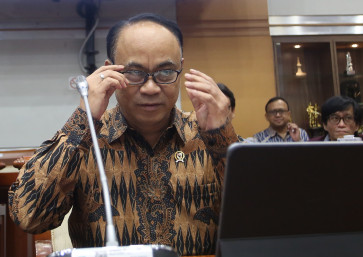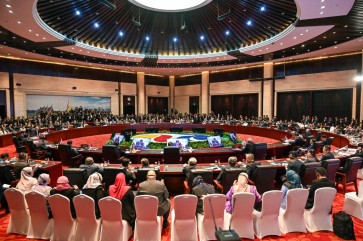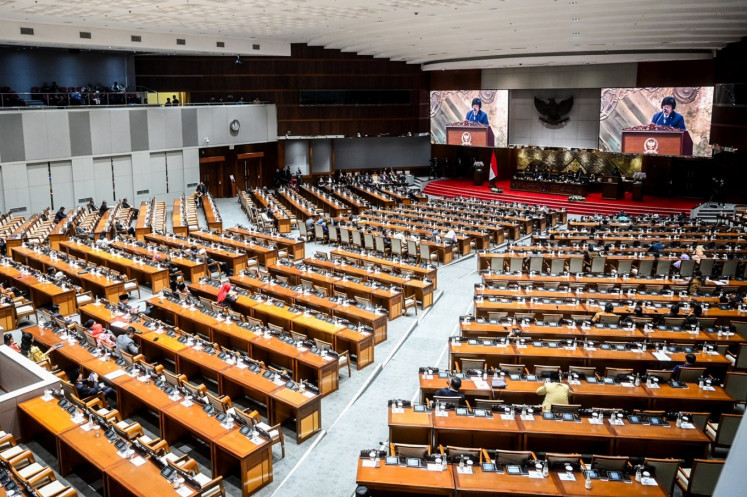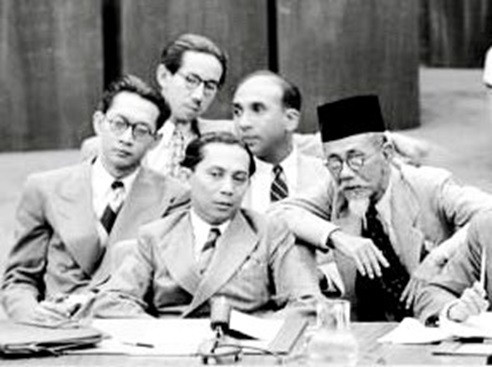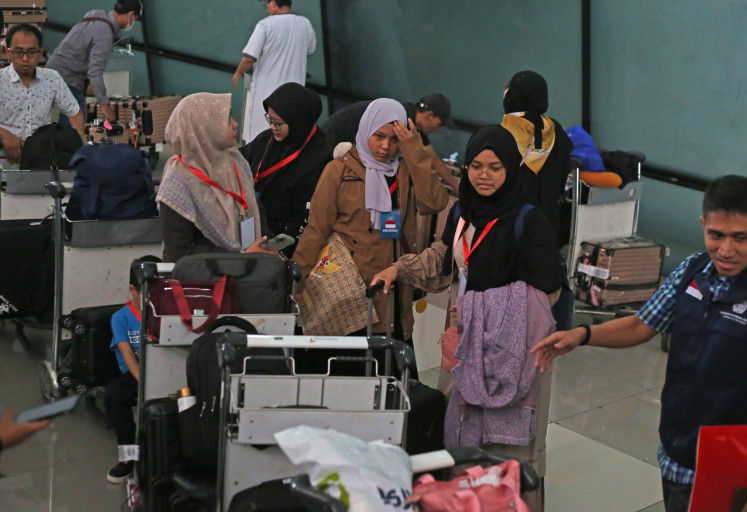China’s AI development faces increasing challenges
Given that China is seen as its systemic competitor, the US has concerns about the comprehensive development of China's AI technology and is taking measures to restrict its growth.
Change text size
Gift Premium Articles
to Anyone
 Fourier's GR-1 humanoid robots are displayed on Thursday during the World
Artificial Intelligence Conference (WAIC) in Shanghai, China. (AFP/AFP)
Fourier's GR-1 humanoid robots are displayed on Thursday during the World
Artificial Intelligence Conference (WAIC) in Shanghai, China. (AFP/AFP)
S
ince the Donald Trump administration, the United States has steadily tightened its restrictions and sanctions against China in high technology, aiming to slow down China's progress in advanced technology and safeguard its own competitive edge. This policy has persisted into the current Joe Biden administration. Yet, in the realm of artificial intelligence (AI), there appears to be a notable willingness on the part of the US to engage in cooperation with China.
Over the past year, through various governmental exchanges, the US has consistently shown readiness to collaborate with China on establishing a global framework for AI regulation. A prominent instance was the inclusion of a Chinese delegation at the inaugural global AI Safety Summit at Bletchley Park last November, an occurrence that likely required tacit approval from the US, given its close ties with the UK. Recently, senior officials from both nations engaged in AI discussions in Switzerland, marking a resurgence of China's presence on the global AI stage.
Despite these cooperative gestures, the technological rivalry between the US and China, particularly in AI, will continue and even escalate further. This stems primarily from the strategic significance of AI, which compels the US to exert maximum pressure on China.
Throughout the history of science and technology, achieving comprehensive and efficient technological support for production has been a persistent challenge. With advances in generative AI, this form of new technology holds promise in easing mundane tasks and allowing for more creative and impactful work. It can revolutionize production processes, enhance supply chain management, optimize product design and boost the overall efficiency and innovation capabilities.
AI's significance lies in its role in scientific research and technological innovation, aiding in large-scale data analysis and simulation experiments to expedite research processes. Additionally, it has great potential to enhance military efficiency and strike capabilities. Given its transformative nature, mastery of AI technology will confer hegemonic status in global politics and economics. Given that China is seen as its systemic competitor, the US has concerns about the comprehensive development of China's AI technology and is taking measures to restrict its growth.
A recent report released by MacroPolo, the in-house think tank of the Paulson Institute, shows that in the global AI talent field, the US remains the undisputed global hegemon, but China's strength in talent cultivation and talent growth prospects is rather strong.
In the previous survey, only 11 percent of top AI talents (top 20 percent) chose to work in China, while the US hired nearly 60 percent of them. However, this survey shows that now 28 percent of top AI talents choose to work in China, while 42 percent work in the US. It can be seen that in recent years, the gap between the two countries has narrowed significantly, with the trend of AI talent job location shifting from US dominance to competition between the US and China.
As it stands, China's growing demand for AI talent is driven by its rapid industry expansion and intensified efforts in talent cultivation by universities and tech companies. China's increasing indigenous AI capabilities are the primary reason for shifts in top AI talent migration. While the US remains dominant in global AI research and appeal, the rising influence of China suggests a need for the US to bolster measures regarding China's industry and research development, alongside enhancing its own research attractiveness.
Despite multiple rounds of sanctions, China's ongoing advancements in research and development remain evident. Therefore, the US must enhance efforts to effectively hinder the progress of Chinese AI technology.
Moreover, the American business community has consistently opposed US sanctions targeting China, citing substantial investments and profit interests in the country. This opposition has been a persistent obstacle to imposing extensive sanctions against China.
Yet, for the entire US business community, the importance of the Chinese market is decreasing. Last year, American and Western companies withdrew hundreds of billions of dollars in profits from the Chinese market, and investment institutions continue to reduce investment scales. This also means that once the US government is ready to launch corresponding deep sanctions against China, the pressure from the business community to oppose this will be even more limited.
All in all, in the field of AI, China faces excessive restrictions that severely hinder technology research and application. Its limited openness and social freedom further impede its AI advancement. Currently, China's AI development relies largely on its past accumulations. However, as US sanctions deepen and targeted measures strengthen, its AI industry development is poised to face even greater challenges.
***
The writer is a research fellow at ANBOUND.


